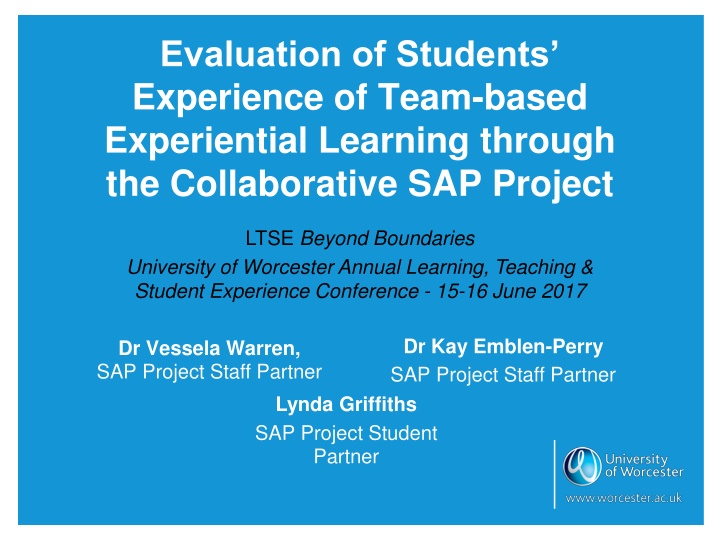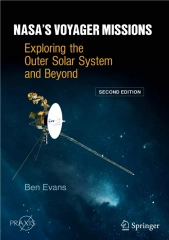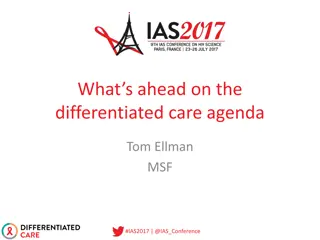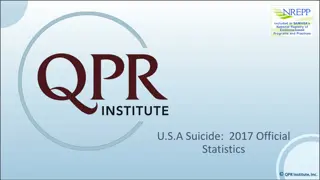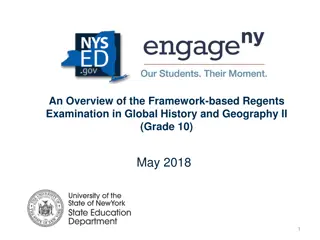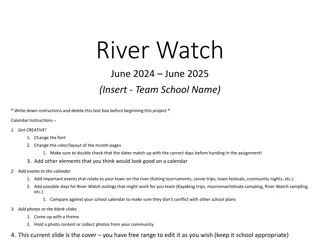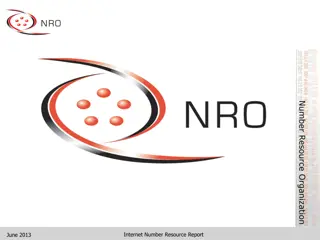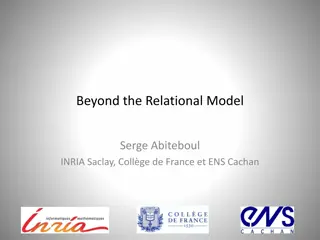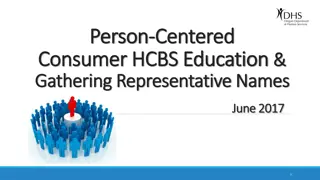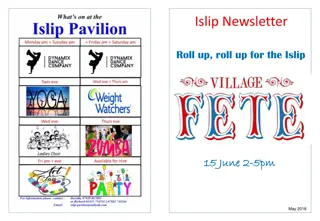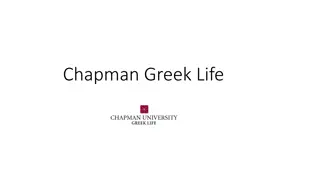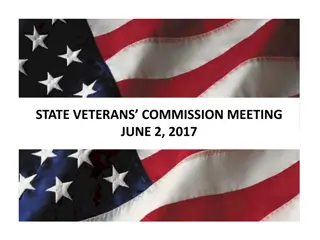Evaluation of Students' Experience through SAP Project - University of Worcester Conference
Students' experiences of team-based experiential learning through the collaborative SAP Project at the University of Worcester were evaluated during the Annual Learning, Teaching & Student Experience Conference. The research aimed to explore perceptions of teamwork, bridging the gap between theoretical benefits and student engagement. The study was conducted in the context of the Students as Academic Partners (SAP) project scheme, focusing on enhancing the quality of learning and teaching experiences.
Download Presentation

Please find below an Image/Link to download the presentation.
The content on the website is provided AS IS for your information and personal use only. It may not be sold, licensed, or shared on other websites without obtaining consent from the author.If you encounter any issues during the download, it is possible that the publisher has removed the file from their server.
You are allowed to download the files provided on this website for personal or commercial use, subject to the condition that they are used lawfully. All files are the property of their respective owners.
The content on the website is provided AS IS for your information and personal use only. It may not be sold, licensed, or shared on other websites without obtaining consent from the author.
E N D
Presentation Transcript
Evaluation of Students Experience of Team-based Experiential Learning through the Collaborative SAP Project LTSE Beyond Boundaries University of Worcester Annual Learning, Teaching & Student Experience Conference - 15-16 June 2017 Dr Kay Emblen-Perry SAP Project Staff Partner Dr Vessela Warren, SAP Project Staff Partner Lynda Griffiths SAP Project Student Partner
Todays Session Theoretical and Practical Background Project Purpose & Objectives Methodology Initial Findings & Emerging Themes Suggestions for Improving Teamwork Learning Questions & Answers
Theoretical Background Research shows that students prefer student-centred, active learning to instructivist lectures (McKeachie, 2002; Oblinger and Oblinger, 2005; QAA, 2012) which encourages learning for insight rather than learning for technique (Beech and MacIntosh, 2012). Literature suggests active learning can increase student engagement (Cooper et al., 2010), can improve grades (Bleske et al., 2014), can generate softer skills (Christenson, Reschly and Wylie, 2012) and may also deliver benefits to students, lecturers and universities (Harvey et al., 2006). Collaborative learning (Johnson et al., 1991), problem-based learning (Savery and Duffy, 1995), team working (Michaelsen et al.2009) and practical projects (Harvey et al, 2006) seem to be effective to enhance the quality of the students learning and teaching (L&T) experience.
Practical Background The use of teams also has become more prevalent in Higher Education as it promotes student active and self-directed learning (deep learning). However, we have observed that whilst students favour active learning, they are not fully engaged in learning through teamwork. Informal evaluation across a number of modules suggests that students are reluctant to engage in teamwork which appear to present barriers to effective collaborative learning. The project aims to formally explore students perceptions of teamwork in order to understand the value-action gap between theoretical benefits available and willingness of students to engage in team-based activities.
SAP Project Context This research is undertaken through the University of Worcester Students as Academic Partners (SAP) project scheme which employs students as active partners within a collaborative staff-student L&T research project. In the SAP project team are two module leaders, in the role of SAP Project Staff Partners and one of the current students, in the role of SAP Project Student Partner.
SAP Project Objectives 1. To explore students experiences of teamwork as an experiential learning approach. 2. To identify key success factors for enhancing students experiences of teamwork. 3. To share opportunities to improve experiential L&T strategies with other academics.
Methodology The SAP project uses a survey to collect data from students enrolled on 5 innovative, practical modules across Levels 4, 5, 6 and 7 taught at Worcester Business School. All modules are designed by the module leaders to engage students in active, student-centred activities and experiential learning through teamwork on live projects and cases. This research utilises reflection-on-action (Sch n, 1987) to generate students perception before and after their involvement in teamwork. 91 students participated in the survey.
Students Initial Expectations of Teamwork 1 Positive perceptions 35% Negative perceptions 53% Neutral perceptions 12%
Students Initial Expectations of Teamwork 2 Negative expectations: Hoped it would not prove a hindrance to me Stressful, un-organised, overreliance on individuals Stressful, relying on others can be a pain I m expecting to do the majority of work again Worried that I will be in a group with people not wanting to achieve the same group Positive expectations: More can be learned in a group than as individuals Sharing work, easier to manage work Better results due to all of our ideas Creative and fun
Experience of Teamwork vs. Expectations 1 Teamwork was worse than expected, 18% Teamwork was better than expected, 42% Teamwork was as expected, 40%
Experience of Teamwork vs. Expectations 2 Organisation of tasks was easier than I thought and we all agreed. Better than expected. Meeting new people was good, everyone has different strengths. In the end we worked effectively with the use of clear project management. The group worked well and achieved a good grade. Good, everyone equally participated.
Students Value of Teamwork Aspects of teamwork valued most: Aspects of teamwork valued least: 1. Support available from working together (24%) 1. Lack of commitment by other team members (44%) 2. Sharing workload (21%) 2. Team conflict & disagreements (17%) 3. Collaborating & sharing ideas (19%) 3. Poor team communication (16%) 4. Meeting new people and being exposed to new ideas and cultures (18%)
Key Emerging Themes Students recognise the importance of teamwork: o but initially they dislike participating in it; o and upon reflection most appear to have had a positive .experience. Students felt that they have benefitted from peer support and sharing workload. Students reflections suggest that they enjoy knowledge co-creation and sharing. Students appear to recognise opportunities offered by teamwork for making new friends and gaining exposure to new ideas and different cultures. Contrary to team-based learning theory the students need specific instruction in teamwork as they do not perceive they are learning the teamwork practices and skills during the process.
KSF for Enhancing Students Experience of Teamwork Response rate Student responses: Tutors should . Provide additional guidance in teamwork practicalities, responsibilities and opportunities provided Allow students to get to know each other better before selecting teams Pick teams Hold meetings with teams to monitor individuals' contribution Grade individual contributions Take actions that encourage participation from all team members Limit the number of teamwork modules and limit to Level 4/5 Offer individual option for students not willing to participate in teamwork Allow more time for students to pick their team Allow more time for team to organise project Allow more time to settle into team before work starts 27% 16% 16% 11% 5% 5% 5% 3% 3% 3% 3%
Suggestions for Good Practice Students need specific upfront guidance in teamwork practices and teamwork-related skills in order to learn how to be collaborative and productive in the process. Tutors need to continually support the students and reinforce good teamwork practices throughout. Implement team building activities at the beginning to enable students to get to know each other better before they form teams. Build in activities and time for team members to settle in their teams before they commence their teamwork tasks or projects. Build in checkpoints with teams to monitor progress, review learning and address performance issues. Consider methods for individual and team grading.
References Beech, N. & MacIntosh, R. (2012). Managing Change: Enquiry and Action. Cambridge. Cambridge University Press Bleske, B.E., Remington, T.L. & Wells, T.D. (2014). Team-based learning to improve learning outcomes in a therapeutics course sequence. American Journal of Pharmaceutical Education. 78(1), p. 13 Christenson,, S. Reschly, A. & Wylie, C. (2012). Handbook of Research on Student Engagement. Dordrecht: Springer Cooper, S., Treuille, A., Barbero, L., Leaver-Fay, A., Tuite, K., Khatib, F., Snyder, A., Beenen, M., Salesin, D., Baker, D. and Popovic, Z (2010). The Challenge of Designing scientific Discoveyr Games. ACM 40. Available from: http://www.dl.acm.org Harvey, L., Drew, S. & Smith, M. (2006). The First-year Experience: A Review of Literature for the Higher Education Academy, Available from: http://www.heacademy.ac.uk/research/Harvey_Drew_Smith.pdf Johnson, D.W., Johnson, R.T., & Smith, K.A. (1991). Cooperative Learning: Increasing College Faculty Instructional Productivity. ASHE-ERIC Higher Education Report No. 4, 1991. Available from: https://eric.ed.gov/?id=ED343465 McKeachie, W. J. (2002). MeKeachie's Teaching Tips: Strategies, Research, and Theory for College and University Teachers (11th ed.). Massachusetts: Houghton Mifflin Company. Michaelsen, L., Sweet, M. & Parmalee, D. (2009). Team-Based Learning: Small Group Learning s Next Big Step. New Directions in Teaching and Learning, pp. 7-27. NUS and QAA (2012) Student Experience Research 2012. Part 1: Teaching and Learning: Student Experience Research to Gain Insight into the Quality of the Learning Experience [Internet]. London: National Union of Students. Available from: www.nus.org.uk/PageFiles/12238/2012_NUS_QAA_Teaching_and_Learning.pdf [Accessed 14/05/2016]. Oblinger, D. & Oblinger, J. (2005). Educating the Net Generation., Available from: http//www.educause.edu/educatingthenetgen/ Savery, J. & Duffy, T. (1995). Problem Based Learning: An Instructional Model and its Constructivist Framework. Educational Technology, 35, pp. 31-38. Sch n, D. (1987) Educating the Reflective Practitioner: Towards a New Design for Teaching and Learning in the Professions. San Francisco, CA: Jossey:Bass.
Thank You! Questions?
